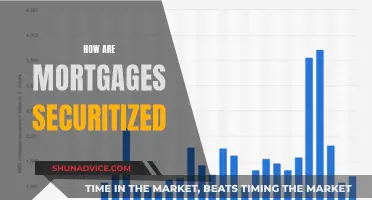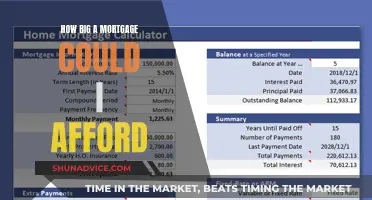
The world of mortgages involves a complex interplay of lenders, investors, and borrowers. Funding a mortgage loan involves a lender wiring the mortgage money to an escrow account, with the funds typically held in the title company's bank account. The process of mortgage funding involves various fees, including origination fees, application fees, processing fees, and underwriting fees, which are paid during the closing of the mortgage. Lenders use their own funds or borrow from larger banks to extend loans, and they make money through interest, fees, and mortgage-backed securities. Investors, such as pension funds, insurance companies, and foreign governments, purchase these mortgage-backed securities for long-term income. The secondary mortgage market also plays a role, where mortgage originators like banks and mortgage bankers use their own funds to close mortgages, while mortgage brokers act as intermediaries. Ultimately, the funding of mortgages involves multiple entities and a range of financial instruments, creating a dynamic and intricate system.
| Characteristics | Values |
|---|---|
| Who funds mortgages? | Banks, mortgage bankers, mortgage brokers |
| How do banks fund mortgages? | Traditionally, banks financed mortgages through deposits received from customers. Now, they also sell mortgages to the bond markets (secondary markets). |
| How do mortgage bankers fund mortgages? | Mortgage bankers use their own funds or a warehouse line of credit to fund loans. |
| How do mortgage brokers fund mortgages? | Mortgage brokers do not use their own funds. They rely on the selling and securitizing of loans and warehouse lines of credit to support loan originations. |
| Who buys mortgages? | Investors such as foreign governments, pension funds, insurance companies, banks, GSEs, and hedge funds. |
| Why do investors buy mortgages? | For income from the interest generated by the loan. |
| How do lenders make money from mortgages? | Origination fees, yield spread premiums, discount points, closing costs, mortgage-backed securities (MBS), and loan servicing. |
| What is the process of mortgage loan funding? | Lenders review loan documents, determine that requirements are met, and then wire the funds to the title or escrow company. |
What You'll Learn

Banks use their own funds to close mortgages
In this model, the bank holds and services the mortgage loan for the entire term, which could range from 15 to 30 years or more. During this period, the bank is responsible for
Understanding Mortgage Finance Charges: Computation Methods Explained
You may want to see also

Mortgage brokers do not use their own funds
A mortgage broker is a financial intermediary who matches home borrowers with potential lenders to obtain the best possible mortgage terms for the borrower. Mortgage brokers act as independent agents for banks or mortgage bankers, putting them together with clients (borrowers). They do not use their own funds to originate mortgages. Instead, they gather the financial information needed for the mortgage application process, such as income, assets, debt, employment documentation, and credit history. This information is then passed on to potential lenders. The broker determines an appropriate loan amount, loan-to-value (LTV) ratio, and the borrower's ideal loan type. They then submit the application to a lender for approval and collect a commission called an origination fee from the lender as compensation for their services. The borrower may be responsible for paying all or part of this fee in the closing statement.
Mortgage brokers do not fund mortgages with their own money. Instead, they act as intermediaries, bringing together borrowers and lenders. Mortgage brokers typically earn a commission when they bring lenders business, which can create a conflict of interest. They may be incentivized to steer borrowers towards lenders who pay them higher commissions, rather than those who may better suit the borrower's needs. It is important for homebuyers to understand how mortgage lenders get paid and make money to avoid paying unnecessary fees.
Mortgage lenders, on the other hand, use their own funds to extend mortgages. They make money through origination fees, yield spread premiums, discount points, closing costs, mortgage-backed securities (MBS), and loan servicing. Mortgage-backed securities allow lenders to package and sell loans, providing them with income from the interest generated by the loan. This income is steady and comes in every month or according to the borrower's payment schedule. By selling these securities, lenders can free up money to extend additional mortgages and earn more income.
The secondary mortgage market involves several institutions that carve out percentages of the initial fees and/or monthly cash flows. These include mortgage originators, such as retail banks, mortgage bankers, and mortgage brokers. Mortgage bankers, unlike mortgage brokers, typically use a warehouse line of credit to fund loans. Investors are the end-users of mortgages and include foreign governments, pension funds, insurance companies, banks, and hedge funds. These investors buy mortgages or mortgage-backed securities for long-term income and potential yields based on credit quality and interest rate risks.
Mortgage Bankers: Salary Insights and Payment Structures
You may want to see also

Investors buy mortgages for income
Investors play a crucial role in keeping the mortgage market operational by providing the funds and guidelines that lenders use to create mortgages for prospective homeowners. Investors buy mortgages (or mortgage-backed securities) primarily for the income they generate. The interest on the loan provides a steady income stream, which is particularly appealing to institutional investors, such as pension plans, insurance annuity companies, and mutual funds. This regular income is often backed by the government or government-sponsored agencies, making it a relatively low-risk investment with higher yields than other low-risk bonds.
Mortgages are funded through the primary and secondary mortgage markets. In the primary market, lenders loan money to individuals to buy or refinance homes. This market connects people seeking mortgages with lenders providing them. However, if lenders relied solely on monthly mortgage payments, they wouldn't have sufficient funds to loan money to other borrowers. This is where the secondary mortgage market comes into play. In this market, lenders sell mortgage loans to investors, receiving funds to create more loans. These investors become the end users of the mortgages.
The secondary mortgage market includes various players, such as foreign governments, pension funds, insurance companies, banks, government-sponsored enterprises (GSEs), and hedge funds. GSEs, like Fannie Mae and Freddie Mac, are supervised by the government but are not government agencies. They play a crucial role in setting eligibility guidelines for conventional loans and keeping cash flowing in the mortgage market by purchasing conforming loans. Mortgage originators, including retail banks, mortgage bankers, and mortgage brokers, also play a role in the secondary market. Mortgage bankers, for example, use a warehouse line of credit to fund loans. Mortgage brokers act as independent agents, connecting banks or mortgage bankers with clients (borrowers).
Mortgage-backed securities (MBS) are a common vehicle through which investors buy mortgages. MBS allows lenders to profit by packaging and selling loans to investors. Investors in MBS can include pension funds, insurance companies, and other institutional investors seeking long-term income. By selling these loans, lenders free up capital to extend additional mortgages and earn more income. Additionally, lenders may continue to earn revenue by servicing the loans they sell through MBS.
Late Mortgage Fees: Collection Methods and Your Options
You may want to see also

Lenders package and sell loans
The MBSs are then sold to securities dealers, who are often Wall Street brokerage firms. These dealers will then sell the MBSs as securities to investors, such as foreign governments, pension funds, insurance companies, banks, GSEs, and hedge funds. These investors are attracted to MBSs due to the potential yields and income offered, as well as the relatively low risk compared to other investments.
Mortgage originators, such as retail banks, mortgage bankers, and mortgage brokers, play a crucial role in the secondary mortgage market. While banks and mortgage bankers use their own funds to close mortgages, mortgage brokers act as independent agents, connecting borrowers with these financial institutions. Mortgage bankers, in particular, may use a warehouse line of credit to fund the loans.
The secondary mortgage market is beneficial to lenders as it allows them to convert less liquid assets into cash, meet cash reserve requirements, and reduce the risk of debt and default. By selling loans, lenders can also earn immediate commissions and generate more revenue by writing and selling new mortgages.
It's important to note that lenders may continue to service the loans they sell, collecting fees for handling administrative tasks and processing mortgage payments. This servicing aspect provides an additional source of income for lenders, even after they have sold the loans to investors.
Applying for a Mortgage: A Step-by-Step Guide
You may want to see also

Lenders charge origination fees
Origination fees are typically paid at closing, along with the down payment and other closing costs. However, some lenders allow borrowers to roll the origination fee into their loan, marketing these as "no-closing-cost mortgages". While this can be appealing to borrowers who don't have enough cash on hand, it often results in paying more in interest overall.
It's important to note that not all lenders charge origination fees, and some may be willing to negotiate or waive these fees. However, if a mortgage has no lender origination fees, it may come with a higher interest rate over the life of the loan.
To get the best deal, it's recommended to apply with multiple lenders, compare Loan Estimates, and choose the lowest-cost offer. Additionally, checking the Loan Estimate document, provided by the lender within three business days of applying, can help understand the expected origination charges.
Mortgage Broker Regulation: What You Need to Know
You may want to see also
Frequently asked questions
Mortgage lenders make money through origination fees, yield spread premiums, closing costs, mortgage-backed securities (MBS), and loan servicing. Mortgage-backed securities allow lenders to make a profit by packaging and selling loans.
Mortgage-backed securities are when lenders group loans of varying profit levels and sell them for a profit. This allows them to free up money to extend additional mortgages and earn more income. Investors are then able to buy these mortgages for long-term income.
Funding a loan happens when the lender wires the mortgage money to escrow. The buyer is then permitted to sign the mortgage documents. The exact timing depends on whether it is a "wet closing" or a "dry closing". In a wet closing, the lender wires the funds immediately on the closing date, whereas in a dry closing, the funds are transferred as soon as possible after closing.







